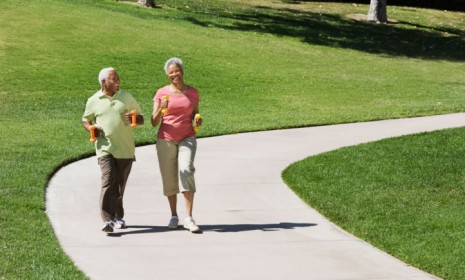Is exercise better for your brain than crossword puzzles?
Going for a walk could be the key to staying sharp well into old age

The question: A relatively large new study published in the journal Neurology takes a look at mild physical exercise's relationship with mental health for the elderly, posing the question: Is going for a brisk walk better for your brain than, say, completing a crossword puzzle?
How it was tested: Nearly 700 people born in 1936 were enlisted for this study, conducted at the University of Edinburgh in Scotland. In 1947, nearly all of them had been given mandatory intelligence and mental health tests in school. That gave researchers a baseline to work with, and decades later, researchers administered MRI scans to the participants at age 70 to document their brain size. For the next three years, participants tracked both daily leisure activities (playing chess, completing crossword puzzles) and daily physical activities (doing chores, going for walks). At age 73, MRI scans were taken again to measure brain shrinkage.
The outcome: There was a "strong and direct correlation revealing that as physical exercise increases, brain shrinkage decreases," says Christopher Wanjek at LiveScience. Better yet: The exercise "did not have to be strenuous," says Michelle Roberts at BBC News. "Going for a walk several times a week sufficed."
The Week
Escape your echo chamber. Get the facts behind the news, plus analysis from multiple perspectives.

Sign up for The Week's Free Newsletters
From our morning news briefing to a weekly Good News Newsletter, get the best of The Week delivered directly to your inbox.
From our morning news briefing to a weekly Good News Newsletter, get the best of The Week delivered directly to your inbox.
What the experts say: "We are coming to appreciate the fact that people who remain physically active are less likely to show cognitive decline," says Stephen Rao, the director of the Cleveland Clinic Schey Center for Cognitive Neuroimaging, which wasn't involved in the study. And keep in mind, says lead author Alan J. Gow, that "our study showed no real benefit to participating in mentally and socially stimulating activities on brain size, as seen on MRI scans, over the three-year time frame."
The lesson: Lace up your walking shoes! But bear in mind, too, that both physical and non-physical activities have many benefits, like fighting chronic diseases and fighting off depression and fatigue, says LiveScience's Wanjek. Really, "there's no harm to pursuing both at any age."
A free daily email with the biggest news stories of the day – and the best features from TheWeek.com
-
 Zimbabwe’s driving crisis
Zimbabwe’s driving crisisUnder the Radar Southern African nation is experiencing a ‘public health disaster’ with one of the highest road fatality rates in the world
-
 The Mint’s 250th anniversary coins face a whitewashing controversy
The Mint’s 250th anniversary coins face a whitewashing controversyThe Explainer The designs omitted several notable moments for civil rights and women’s rights
-
 ‘If regulators nix the rail merger, supply chain inefficiency will persist’
‘If regulators nix the rail merger, supply chain inefficiency will persist’Instant Opinion Opinion, comment and editorials of the day